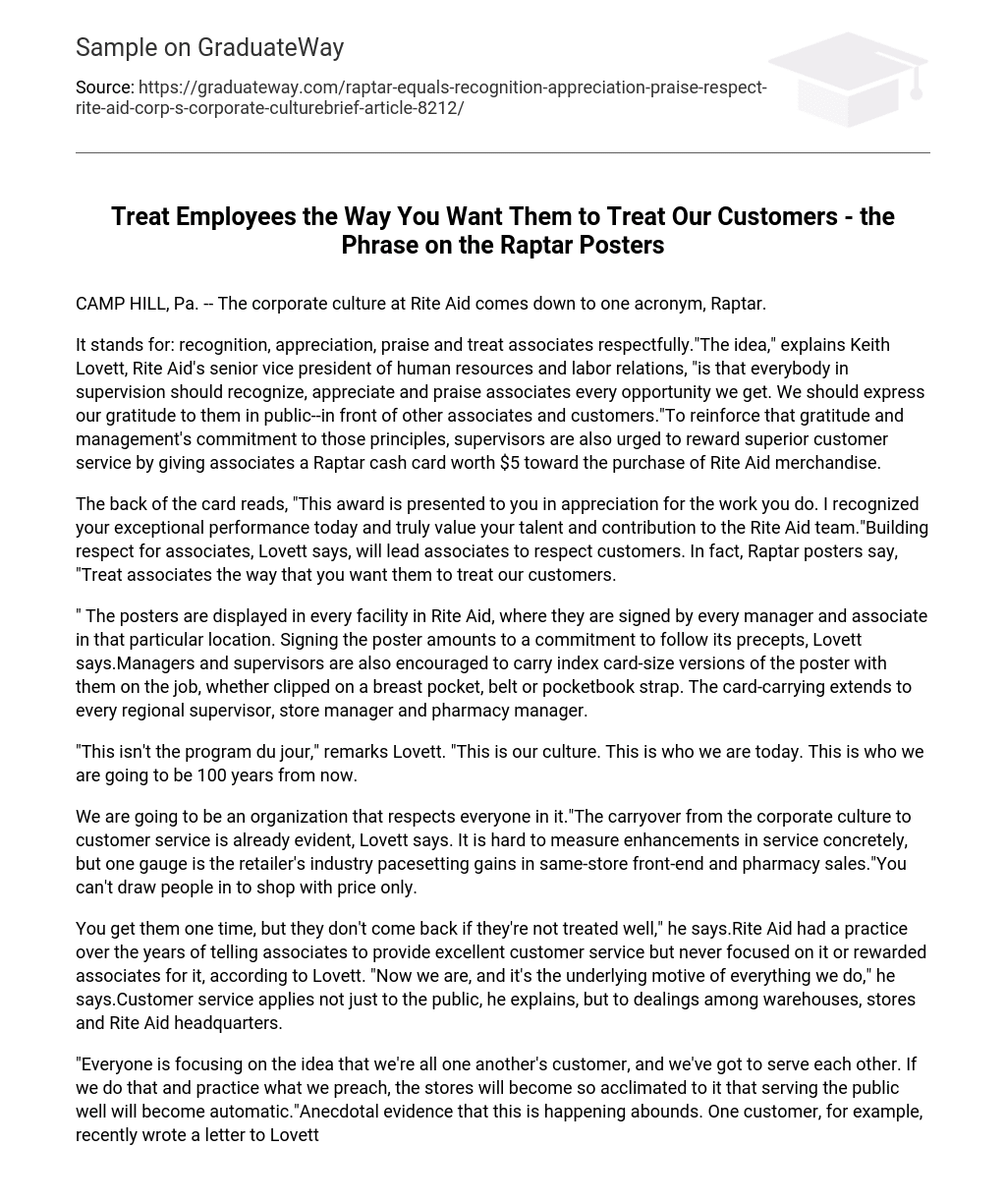CAMP HILL, Pa. — The corporate culture at Rite Aid comes down to one acronym, Raptar.
It stands for: recognition, appreciation, praise and treat associates respectfully.”The idea,” explains Keith Lovett, Rite Aid’s senior vice president of human resources and labor relations, “is that everybody in supervision should recognize, appreciate and praise associates every opportunity we get. We should express our gratitude to them in public–in front of other associates and customers.”To reinforce that gratitude and management’s commitment to those principles, supervisors are also urged to reward superior customer service by giving associates a Raptar cash card worth $5 toward the purchase of Rite Aid merchandise.
The back of the card reads, “This award is presented to you in appreciation for the work you do. I recognized your exceptional performance today and truly value your talent and contribution to the Rite Aid team.”Building respect for associates, Lovett says, will lead associates to respect customers. In fact, Raptar posters say, “Treat associates the way that you want them to treat our customers.
” The posters are displayed in every facility in Rite Aid, where they are signed by every manager and associate in that particular location. Signing the poster amounts to a commitment to follow its precepts, Lovett says.Managers and supervisors are also encouraged to carry index card-size versions of the poster with them on the job, whether clipped on a breast pocket, belt or pocketbook strap. The card-carrying extends to every regional supervisor, store manager and pharmacy manager.
“This isn’t the program du jour,” remarks Lovett. “This is our culture. This is who we are today. This is who we are going to be 100 years from now.
We are going to be an organization that respects everyone in it.”The carryover from the corporate culture to customer service is already evident, Lovett says. It is hard to measure enhancements in service concretely, but one gauge is the retailer’s industry pacesetting gains in same-store front-end and pharmacy sales.”You can’t draw people in to shop with price only.
You get them one time, but they don’t come back if they’re not treated well,” he says.Rite Aid had a practice over the years of telling associates to provide excellent customer service but never focused on it or rewarded associates for it, according to Lovett. “Now we are, and it’s the underlying motive of everything we do,” he says.Customer service applies not just to the public, he explains, but to dealings among warehouses, stores and Rite Aid headquarters.
“Everyone is focusing on the idea that we’re all one another’s customer, and we’ve got to serve each other. If we do that and practice what we preach, the stores will become so acclimated to it that serving the public well will become automatic.”Anecdotal evidence that this is happening abounds. One customer, for example, recently wrote a letter to Lovett lavishing praise on a California pharmacy manager who helped her get prescriptions when she overstayed a visit far from her hometown.
Associates at all levels, Lovett stresses, are being authorized to handle customer difficulties. “It’s inevitable that you’re going to have a customer who has a problem,” Lovett admits. “The idea is take care of it. Fix it.
You have that authority.”That kind of attitude toward associates is helping Rite Aid get and retain new recruits, Lovett notes. To enhance hiring at the store level, the company is advising store managers what questions to ask prospective hires to excite them about coming to work for Rite Aid, he says.To keep turnover at minimum, managers also get tips on how to create an enjoyable atmosphere for new hires.
Training programs, including workplace orientation, are being enhanced. The company is extending initial guidance periods for newcomers and having a more seasoned associate work closely with them for their first couple of weeks.Recruits also are being encouraged to consider various career paths in the company. “By communicating more with them about long-term opportunities I think we’ll turn them on to the idea that retailing is really a lot of fun,” Lovett comments.
Retailers generally have a hard time keeping front-end cashiers, he says, because their management potential tends to be disregarded. Rite Aid by contrast is trying to open up cashier positions to advancement possibilities.Similarly the chain wants to get more pharmacists to consider moving into operations and on the path to becoming regional and senior vice presidents. “They have a vast knowledge of the business,” Lovett remarks.
“They just need experience in some nonpharmacy areas.”One current attraction of a Rite Aid job at any level is the company’s payroll stock purchase plan. Associates who bought stock at $1.75 or $3 “are doing very well and are pretty excited about the future,” he says.
But Rite Aid’s stock price will only be as strong as the company’s customer service, Lovett says, and with that in mind the chain is conducting programs that include mystery shopper assessments. Associates whose stores fare well in the surprise checks are positively reinforced.”We want to be the neighborhood drug store that treats every customer as a friend and neighbor,” says Lovett. “If we do that job and do it well, we’re going to give serious heartburn to our competitors.
And that’s what’s fun.”





